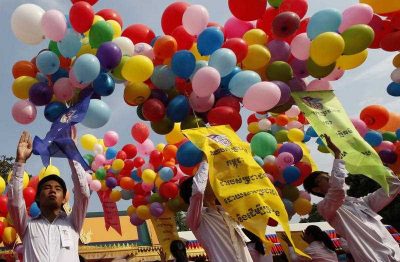15 January 2015
Author: Kheang Un, Northern Illinois University
Cambodia had a year of political reform in 2014, and observers are sceptical about how much change it will bring. But it might be premature to dismiss Prime Minister Hun Sen’s reform efforts as cosmetic.
Cambodian politics began 2014 with a series of mass protests organised by the Cambodian National Rescue Party (CNRP) over alleged ‘massive fraud’ surrounding the 2013 parliamentary election. The demonstrations evolved into cross sector protests over land rights and wage increases. The government responded with an armed crackdown on a protest, causing four deaths and the subsequent suspension of freedom of assembly nationwide.
The political deadlock lasted until July when the ruling Cambodian People’s Party (CPP) and the CNRP reached an agreement which ended the CNRP’s boycott of the National Assembly.

The agreement includes an overhaul of the National Election Committee (NEC) — widely believed to be CPP-controlled — and reform of the National Assembly. The NEC will become a constitutional body with an independent budget and inclusive membership drawn from the two major political parties. The National Assembly will evenly split the chairmanship of parliamentarian commissions, and formalise the positions and ranks for the leadership of the assembly.
Before the elections in 2013, the CPP relied on a system of patronage based on handouts to peasants and infrastructure projects paid for by financial contribution from party/government officials and business tycoons. The symbiotic relationship between business tycoons and the CPP resulted in major human rights violations, particularly land grabbing. On the question of wages, the government seemed to side with investors. Opposition parties and unions claimed that low wages were associated with widespread corruption within the government, but the government claimed that higher wages and constant strikes would undermine Cambodia’s global competitiveness.
Societal pressure, evidenced by the 2013 election result, has ignited a sense of urgency for the CPP to initiate reforms. Patronage handouts seem to have halted. There are signs — though limited in scope — that the CPP is responding to the problem of land-grabbing by the elite. The government confiscated undeveloped concessions and redistributed them to peasants, and a CPP lawmaker intervened on behalf of victims of land grabbing.
Another sign of the government responding to voters’ concerns came with wage increases. Cambodian garment factory workers had fought for higher wages for years, enduring frequent and at times violent government crackdowns. By 2014, their protests had created the potential for cross-sector protests that could plausibly shake the CPP’s entrenched power. Since the last election, the government has actively engaged in mediating negotiations between unions and investors. In November, the government recommended a wage increase from the base salary of US$100 per month to $128. Teachers’ salaries increased from $105 to $128 withfuture incremental increases to $250 by 2018.
The CPP carried out reform at the national level. A cabinet reshuffle replaced some ageing ministers with more dynamic and better-educated ones. The government also improved its revenue collection.
But by how much will recent reforms usher in further democratisation? The CPP has been sceptical of Western-style democracy since the start of its reintroduction by the United Nations in early 1993. Instead, it argues for an Asian model exemplified by Singapore and Malaysia. But despite this rhetoric, until 2013 the Cambodian state was a crony capitalist state in which state resources and government positions were awarded based on patronage. The 2013 election forced the CPP to realise that continued domination requires meaningful reforms addressing people’s changing expectations: social equality, justice, and quality public services.
Many observers are sceptical of the CPP’s recent reform efforts. Effective reform requires not only new policies but also a restructuring of the government bureaucracy based on meritocracy. This has not yet been systematically adopted due to the CPP’s long history of never discarding its loyalists — a culture that has helped to unify the CPP in light of its factional nature. But Prime Minister Hun Sen is a pragmatist who has already adapted to changing circumstances to stay on top of the political game. Meanwhile, the CNRP is gaining popularity among the general population due to its rival’s structural problems and is gaining numbers in the National Assembly. All these factors could help move Cambodia forward — if not to a genuine democracy, to a more inclusive society.
Kheang Un is Assistant Professor of Political Science at Northern Illinois University.
This article is part of an EAF special feature series on 2014 in review and the year ahead.

2 comments:
This land grabbing should started from children as well. Teaching them not to grab someone else foods or toys if they are not belong to them. Small teached can go for a long way.
Professor Kheang Un you either a hun sen's fan or you've got it completely wrong . Mark my words for it.
Post a Comment